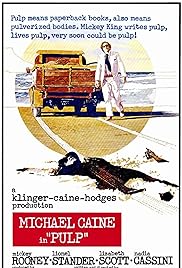PULP
(director/writer: Mike Hodges; cinematographer: Ousama Rawi; editor: John Glen; cast: Michael Caine (Mickey King), Mickey Rooney (Preston Gilbert), Lionel Stander (Ben Dinuccio), Lizabeth Scott (Princess Betty Cippola), Nadia Cassini (Liz Adams), Al Lettieri (Jake Miller), Dennis Price (Mysterious Englishman), Cettina Borg Oliver (Gilbert’s Mother), Leopoldo Trieste (Marcovic); Runtime: 95; United Artists; 1972)
“It had some fun in it.”
Reviewed by Dennis Schwartz
Director-writer Mike Hodges (Get Carter) in his second feature comes up with an offbeat comedy. It easily lives up to the meaning of its title. The film was roughly drawn, it was absurd, it had a thin plot, but in its crassness there are some laughs to be had for those who are not turned off by its audacity to be so caustic. The film’s best feature is Mickey Rooney hamming it up.
Caine is Mickey King, a writer using many aliases as he cranks out cheap paperback gangster novels while living abroad from London. He was a funeral director who left his wife and kids for the chance to write pulp novels such as “My Gun is Long,” under the name of Guy Strange.
Caine’s approached by Ben Dinuccio (Lionel Stander) and offered mucho money to live in an Italian Mediterranean island villa for a month to ghost write the autobiography of a mystery celebrity who wishes to disclose some secret memoirs. But first he must go on a mystery bus tour where a contact person is to meet him. He thinks that contact person is Jake Miller (Lettieri), someone who sits next to him on the bus and is reading one of his pulp books. But his contact turns out to be a doll named Liz (Nadia), who says that Preston Gilbert (Rooney) is her sugar daddy. He finds out from her that the one who hired him is an ex-Hollywood actor who played only Mafia roles and was known to hang out with them offscreen.
Miller mistakenly uses King’s room, as King decides it’s easier to switch rooms than argue with the guy. In the morning he discovers that Miller was knifed to death while taking a bath: that he’s a transvestite, and that he teaches English at Berkeley. This gets him to worry that maybe he was the real target of the assassination.
Rooney as the crass former actor, who left Hollywood some fifteen years ago because he was kicked out of the country for his mafioso connections, is refreshingly upbeat and bizarre playing the role of a practical joker and a wealthy idler. He lives with his elderly deaf mother on his island villa and with his partner/public relation man Ben, and his lady friend Liz. During one week of interviews for the book Preston talks nonstop, giving the ghost writer enough info to write a number of books. Preston insists the book come with an opening quote from Samuel Goldwyn: “We all passed a lot of water since then.”
When Preston celebrates the anniversary of his dead father at an outdoor restaurant, one of the many guests is one of his many ex-wives, Princess Betty Cippola (Scott). Her hubby, the prince, is a ‘law and order’ politician. In front of the party guests, a contract killer dressed as a priest kills Preston and nearly gets King before escaping.
King proceeds to investigate the following: Gilbert’s secretive past, Gilbert’s ex-wife, a transvestite who’s supposed to be dead but isn’t, and an Italian prince running for office. Pulp was largely dismissed by the early critics as a big disappointment after the hard-hitting Get Carter, but it grew on some as a cult film loaded with many insider jokes. I thought it had some fun in it, but I mainly got off on Rooney’s quirky performance and found the rest of the film uneven.

REVIEWED ON 9/4/2001 GRADE: C